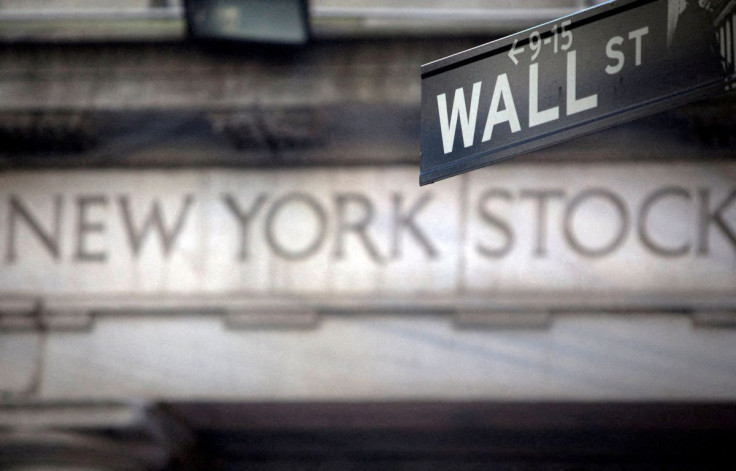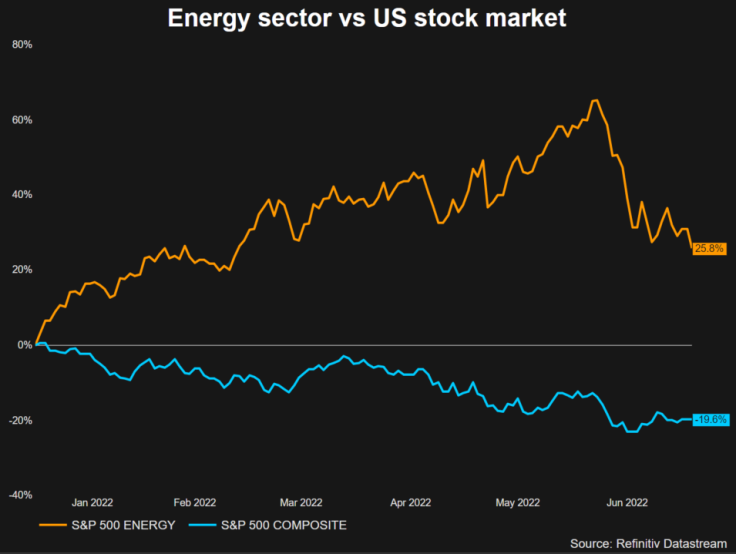Analysis-Recession Fears Deal Blow To Rare 2022 Market Winner: US Energy Shares

A rally in U.S. energy shares is crumbling, as fears of a global recession have prompted investors to take profits in one of the few corners of the stock market that has thrived this year.
The S&P 500 energy sector is still up 20% year-to-date, bucking a broader market swoon.
But the sector has slid 27% since June 8, when it hit its highest in nearly eight years, and now stands at its lowest level since the end of February. Oil major Chevron is down 24% over that time, with Exxon Mobil down 22%.
Energy stocks have slid as crude oil prices tumbled along with other economically sensitive assets as more investors worry the Federal Reserve could trigger a recession with aggressive rate hikes to fight the worst inflation in four decades.
"There is a pretty strong correlation between GDP on the one hand and oil demand on the other," said Stewart Glickman, an energy equity analyst at CFRA. "Right now... the biggest fear you should have if you're an energy investor is that we get a sharp recession."
The surge in oil prices as the global economy recovered from early pandemic lockdowns put a charge into energy shares, which languished during the 2010s. U.S. crude topped $130 a barrel in March, its highest since 2008, driven up as the war in Ukraine "took an already tight market and made it really tight," Glickman said.
After hitting that peak, U.S. crude prices have retreated and settled at $99.50 on Tuesday. Citi commodities analysts said in a note that in a recession scenario, they see oil prices falling to $65 a barrel by year end.
GRAPHIC:

The energy sector's hefty rise in 2022 makes it ripe for investors to lock in gains. Energy remains the only one of 11 S&P 500 sectors in positive territory for 2022, rising 20% year-to-date versus a 19.8% drop for the overall S&P 500.
One reason for the decline is investors "finding the few places where you have had winners and taking that profit before it goes with the rest of the market," said Rick Meckler, a partner at family investment office Cherry Lane Investments.
Other economically sensitive areas of the market have lagged recently. While the S&P 500 dropped 7% since June 8, the airlines sector index fell about 19%, materials companies slid 16% and banks fell 12%.
Over that time, defensive areas of the market have outperformed, helped by the belief their profits are able to weather a downturn. The consumer staples and healthcare sectors are little changed.
"Outflows from Economic Sensitive sectors show signs of caution as investors begin to unwind Energy bets and dial back Financials exposure," Scott Chronert, an ETF and equity strategist at Citi, said in a note on Tuesday.
Still, commodities analysts at Goldman Sachs said in a note on Tuesday that while odds of a recession are rising, "it is premature for the oil market to be succumbing to such concerns." Oil demand should still rise faster than GDP growth this year, it maintained.
Not everyone is bailing out of energy shares. Flows into energy from retail investors have remained "sticky" despite the sector's recent slide, according to Vanda Research.
"In our view, this dynamic reflects a potential shift in sentiment where retail investors may see the outperformance of this Value-oriented sector as more durable than in the past," Vanda said in a note.
© Copyright Thomson Reuters 2024. All rights reserved.




















